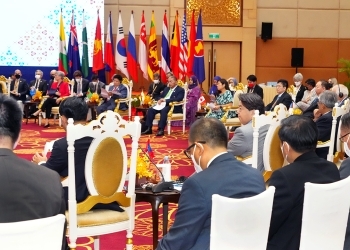ASEAN Regional Forum (ARF)
The 29th ASEAN Regional Forum (ARF) Ministerial Meeting



On August 5, commencing at 14:10 p.m. local time (16:10 am, JST) for 4 hours and 15 minutes, the 29th ASEAN Regional Forum (ARF) Ministerial Meeting (Chair: H.E. Mr. Prak Sokhonn, Deputy Prime Minister and Minister of Foreign Affairs and International Cooperation, Kingdom of Cambodia) was held in Phnom Penh, Cambodia. Mr. HAYASHI Yoshimasa, Minister for Foreign Affairs of Japan, attended the meeting. The overview of the meeting is as follows.
1. Opening Remarks
Minister Hayashi stated that as the security environment in the Asia-Pacific region becomes increasingly severe, Japan would like to recall the importance of ARF which aims at improving the regional security environment and continue to make constructive contributions under ARF. He also stated that Japan would continue and strengthen its efforts to realize a “Free and Open Indo-Pacific”.
2. Regional Situation
(1) Situation in Ukraine
Minister Hayashi stated that Japan strongly condemns Russia’s aggression against Ukraine, which infringes upon sovereignty and territorial integrity of Ukraine and constitutes a grave breach of the Charter of the United Nations that prohibits the use of force. He also emphasized that such unilateral attempts to change the status quo by force is absolutely unacceptable anywhere in the world including Asia. In addition, Minister Hayashi pointed out that Russia’s aggression against Ukraine had caused energy and food price hikes, and urged Russia to stop the aggression immediately.
Other countries expressed serious concerns over the situation in Ukraine, and some countries condemned Russia’s aggression against Ukraine.
(2) Situation in Taiwan
Minister Hayashi stated that the landing of the ballistic missiles launched by China in the sea close to Japan, including its EEZ, is a grave incident concerning the security of Japan and safety of its people, and strongly condemned China’s action. Reiterating the importance of peace and stability across the Taiwan Strait as an indispensable element in security and prosperity in the international community, he urged China to stop military exercises immediately.
Other countries expressed concerns over the increasing tensions in Taiwan Strait, and some ministers expressed condemnation of China’s action responding to Minister Hayashi’s statement.
(3) East and South China Seas
Minister Hayashi expressed strong opposition to any unilateral attempts to change the status quo by force which are continuing and intensifying in the East and South China Seas. He also pointed out that China’s activities that infringe on Japan’s sovereignty in the East China Sea had been continuing and intensifying. In addition, Minister Hayashi mentioned the Arbitral Tribunal's award as to the disputes between the Republic of the Philippines and the People’s Republic of China in 2016 and the Code of Conduct (COC) on the South China Sea, stating that the COC should be consistent with the United Nations Convention on the Law of the Sea (UNCLOS) and should not prejudice the legitimate rights and interests of all stakeholders.
Other countries mentioned the importance of the freedom of navigation and overflight in the South China Sea and of the peaceful resolution of disputes in accordance with international law, in particular UNCLOS, among other matters.
(4) North Korea
Minister Hayashi stated that Japan’s policy vis-à-vis North Korea remains unchanged which is to seek normalization of its relationship with North Korea through comprehensively resolving the outstanding issues of concern, such as the abductions, nuclear and missile issues, and settle the unfortunate past, in accordance with the Japan-DPRK Pyongyang Declaration of September 2002. In addition, He also stated that Prime Minister Kishida had expressed his determination, on various occasions, to meet directly with Chairman Kim Jong Un without any preconditions, and called on North Korea to resume substantive dialogue with the countries concerned toward the complete denuclearization.
Other countries spoke on the importance of the denuclearization of the Korean Peninsula and the full implementation of the UNSCRs, and support for the efforts towards the resolution of the abductions issue was expressed.
(5) Situation in Myanmar
Minister Hayashi stated that Japan seriously deplores the executions of detainees as these actions completely go against the "release of the detainees" which Japan has consistently called for. He stated that Japan would continue to do its utmost to support ASEAN’s efforts towards the implementation of the “Five-Point Consensus,” including humanitarian assistance.
Other countries also expressed serious concerns over the situation in Myanmar including the executions of detainees and emphasized the importance of the implementation of “the Five-Point Consensus.”
(6) Use or threat of nuclear weapons, nuclear disarmament and arms control
Minister Hayashi emphasized that the threat of use of nuclear weapons, as recently made by Russia, let alone, the use of nuclear weapons, should never be tolerated. In addition, He called on all countries to make constructive efforts to maintain and strengthen the NPT. He stated that Japan expects China to play an active role in enhancing transparency of nuclear forces in the region as a nuclear-weapon State under the NPT and as an important player in the international community.
3. Concluding Remarks
In conclusion, Minister Hayashi stated that Japan will continue to contribute to ARF so that it will become a forum that contributes more effectively to confidence building in the region.
[Attachment]
Chairman's Statement (PDF)

